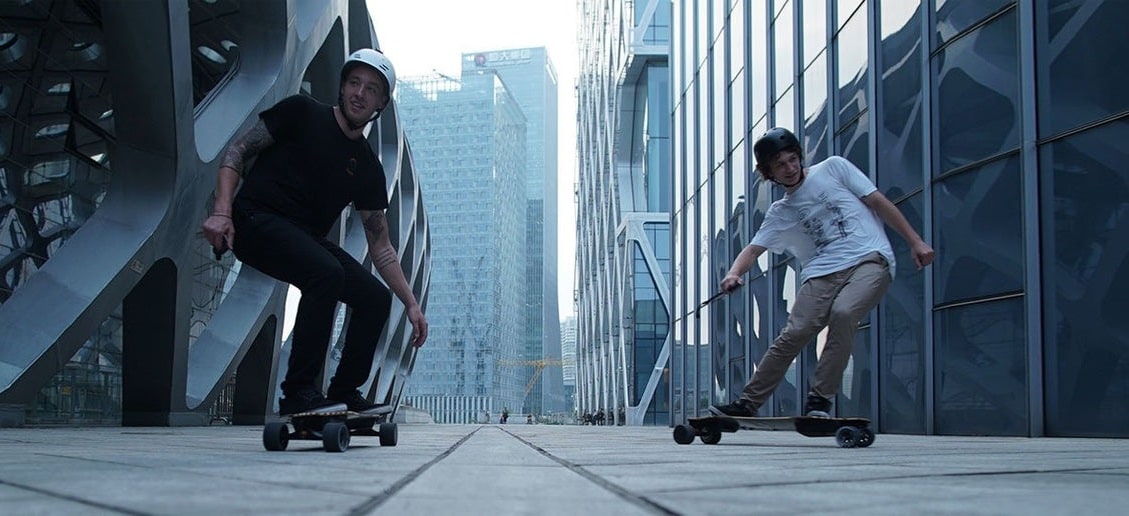Electric skateboards, as a quick way to get around, is attracting all kinds of riders-from commuters to thrill-seekers who love the ride. But one thing worth noticing is the rules for when you can and can't ride electric skateboards; these are getting more complicated. It's important for riders to know these laws to avoid fines and stay safe. In this blog post, we'll give you an overview of the legal status of electric skateboards in the U.S. to help you stay updated on the latest laws.
What Is an Electric Skateboard?

An electric skateboard is a wheeled device with a motor and battery that lets it move independently without a push like the conventional skateboard. Typically, riders use a handheld remote control or by moving their weight on the board to adjust the direction and speed of the ride. Electric skateboards are fantastic for both getting around town and having fun because they come in a variety of sizes, designs, speeds, and functions. They combine aspects of technology with skateboarding to offer a fun and convenient means of short-distance transportation.
Why Is the Legal Status of Electric Skateboards Controversial?
Although electric skateboards have several advantages, such as convenience, eco-friendliness, and cost-effectiveness for short trips, this does not imply that they are allowed or recognized by law everywhere. The legal status of electric skateboards is controversial for several reasons:
What Are They for? Board Games or Vehicles?
The way local governments categorize electric skateboards is a significant problem. While some consider them as toys or bicycles, others see them as vehicles. This uncertainty leads to more inconsistent rules for riders.
How Fast is Too Fast? Safety Gear or Just Daring Fear?
Electric skateboards can reach speeds of 15-25 mph, much faster than walking. This raises safety worries since they lack of standard safety features found in motor vehicles, including instability and inadequate rider protection, as well as slower braking capabilities compared to bicycles and cars, though supporters believe helmets and lights can help keep riders safe.
Where to Ride? Sidewalks or Highways?
The permissible locations for riding electric skateboards are also up for debate. Proponents of sustainable transportation believe that they should be allowed on bike lanes and sidewalks, but opponents contend that because they are motorized, they should be subject to the same laws as motorcycles or mopeds.
Accident Ahead? Who's Responsible?
The unclear classification of electric skateboards creates confusion about insurance needs and who is responsible in case of accidents. This adds more complexity to their legal status and makes it harder for riders to know what to expect.
Eco or Ego? How to Keep Both Sides?
Environmental issues are shaping the laws around electric skateboards. Many cities want to promote eco-friendly transport to cut carbon emissions, but they also need to consider public safety and the risks to pedestrians and other road users.

Are Electric Skateboards Legal In The U.S.?
At the federal level, electric skateboards don't have a specific classification under the National Highway Traffic Safety Administration (NHTSA) like bicycles or motor vehicles. This lack of federal regulation means that individual states can create their own laws regarding their use. Below is a breakdown of some states where electric skateboards are generally allowed, along with notable regulations that might apply:
California
Electric skateboards are legal in California with specific regulations. Riders must be at least 16 years old and wear a helmet. The speed limit is 15 mph, and skateboards can be used on roads with a speed limit of 35 mph or less, as well as on bike lanes, but not on sidewalks. Night riding requires a front light visible from 300 feet and a rear reflector or light visible from 500 feet. Operating under the influence of alcohol or drugs is illegal, subject to DUI laws. Compliance with these rules ensures safety and legality.
Florida
In Florida, electric skateboards are legal. They can be ridden on bike lanes, but in some cities, riding on sidewalks may be prohibited. The speed of electric skateboards is generally limited to 15 mph (about 24 km/h). Riders are typically required to be at least 16 years old, and minors must wear helmets while riding.
Texas
Electric skateboards are legal in Texas and are often classified as "motor-assisted scooters." Riders must follow certain rules: they can only ride on roads with speed limits of 35 mph or lower, and they are allowed in separated bicycle lanes and on sidewalks, depending on local ordinances. Although there is no statewide helmet requirement for electric skateboards, wearing a helmet is recommended for safety.
Colorado
Electric skateboards are legal in Colorado. Riders under 18 must wear helmets. They can operate on roads with speed limits up to 30 mph (48 km/h), as well as on streets, bike lanes, and multi-use paths. Use on sidewalks is subject to local ordinances.
New York
Unlike electric scooters, electric skateboards are not explicitly legalized under New York state law. This means they are technically illegal to operate on public roads and sidewalks. However, enforcement may vary, and some users do ride them without issue.
- Permitted Areas: Electric skateboards are generally not allowed on public streets, sidewalks, or bike lanes in New York. They are only legally allowed on private property.
- Local Ordinances: New York City, in particular, has strict regulations that do not permit the use of electric skateboards on public roads.
- Safety Gear: Even if used on private property, it's recommended to wear a helmet and follow safety guidelines.
Michigan
Yes, electric skateboards are legal in Michigan.They must adhere to specific regulations, including a maximum speed of 25 mph and restrictions on use on roads with speed limits above 25 mph. Riders must be at least 12 years old, and those under 19 must wear helmets. Electric skateboards can be used on streets, bike lanes, and sidewalks, but must yield to pedestrians and comply with local ordinances. They must be equipped with front white lights and rear red reflectors or lights when riding after dark. Local regulations may impose additional restrictions, so it's important to check specific local rules.
Arizona
In Arizona, electric skateboards are legal, but regulations vary by location. They can be used on streets, bike lanes, and multi-use paths, though local ordinances may restrict their use on sidewalks. There is no statewide speed limit, but local laws might impose limits. Helmet use is not required by state law but is recommended for safety. Local cities or counties may have specific rules and restrictions, so it's important to check local regulations for the most accurate information.
How to Check if Electric Skateboards Are Legal in Your Area

Research State Laws
Start by looking up the specific laws governing electric skateboards in your state. Each state has its own regulations that dictate where and how electric skateboards can be used. You can typically find this information on your state's Department of Motor Vehicles (DMV) website or the state legislature's official site.
Visit Local Government Websites
Check your city or county government websites for local ordinances regarding electric skateboards. Local laws may differ from state laws, and municipalities often have specific rules about where electric skateboards can be ridden (e.g., sidewalks, bike lanes, streets).
Consult Legal Resources
Use online legal resources like LexisNexis, Justia, or FindLaw to access statutes related to electric skateboards. These platforms can provide a comprehensive overview of both state and local laws.
Contact Local Law Enforcement
If you're unsure about the legality of electric skateboards in your area, consider contacting your local law enforcement agency. They can provide guidance on current regulations and any enforcement practices related to electric skateboards.
Check Transportation Departments
Your state's transportation department may also have information on electric skateboard regulations. Some states provide guidelines on where electric skateboards can be operated and any safety requirements that must be met.
Check Electric Skateboards Legality in Your Area!
With more people choosing electric skateboards as an enjoyable and practical mode of transportation, it's critical that riders-new and seasoned alike-are aware of the regulations in their area. This information contributes to enjoyable and safe rides. Moreover, always wear a helmet and other protective gear whenever you ride. Riders can enjoy this thrilling form of transportation with confidence if they understand the areas in which electric skateboards are permitted and prohibited, and use the resources at their disposal to stay informed of any changes!



